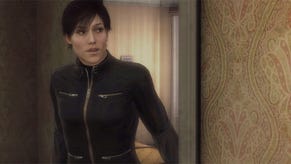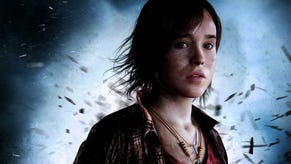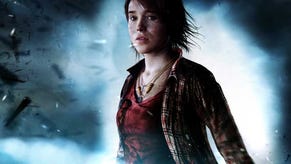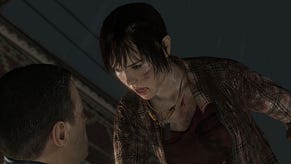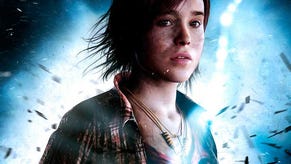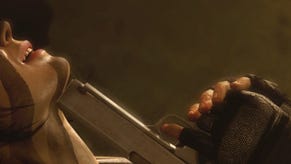Beyond: Two Souls Review
Quantic Dream's latest aims to take interactive storytelling to the next level, but it falters.
This article first appeared on USgamer, a partner publication of VG247. Some content, such as this article, has been migrated to VG247 for posterity after USgamer's closure - but it has not been edited or further vetted by the VG247 team.
Mike Williams, Primary Reviewer
Earlier this week, Beyond: Two Souls writer and director David Cage told the press that "no one should be allowed to define what a video game is or should be; no one has this power." Cage's frustration comes from the fact that some dismissed Beyond because it wasn't enough of a 'game' in their eyes. There's a couple of different names you can call something like Beyond, but 'interactive drama' and 'visual novel' seem to be the ones brought up most of the time. But when you strip all of the names away, is Beyond: Two Souls a successful experience? Unfortunately, not really. Cage was aiming for one thing, but the reality he achieved didn't reach that mark.
Let's get something out of the way: Beyond: Two Souls is a gorgeous game and a grand way to close out the PlayStation 3 era. It looks great in every scene, and every setting is as believable and real as it needs to be. Jodie and her invisible companion Aiden are on a journey and their experiences look stunning, even within the constraints of the game's letterbox format.
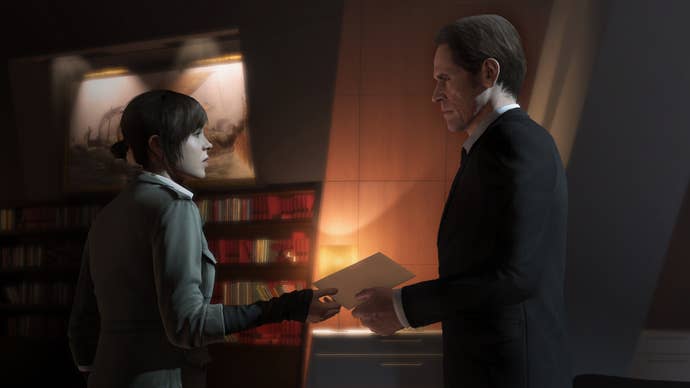
The big-name actors that were heavily emphasized in the game's early marketing pay off. Ellen Page is great as Jodie in her teenage and adult years; you will feel her love, rage, defiance, and weariness. She pulls off the role even when she has little to work with, and her performance capture is superb. Willem Dafoe also does a good job as Jodie's replacement father figure Nathan Dawkins. His performance is less successful, but that's because his story takes him through situations that don't necessarily feel right. Kadeem Hardison has a few moments as Dawkins' assistant Cole, but spends most of the game underutilized. The rest of the cast is hit or miss, but I feel a particular shout out should go to homeless man Stan, who you meet halfway through the game. Actor David Coburn - the voice of Captain Planet oddly enough - does a great job with his role.
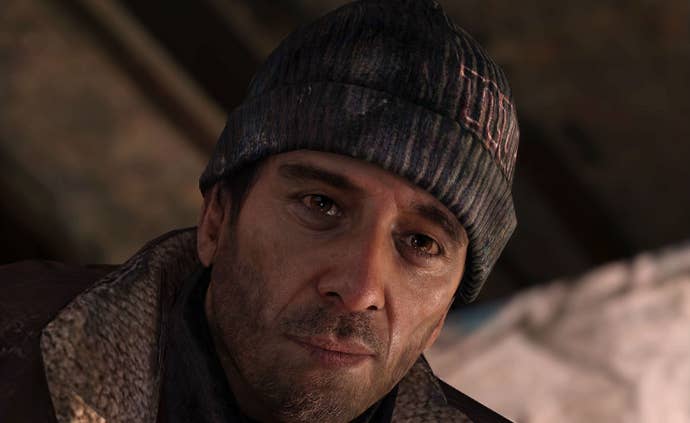
Jodie is pulled through some impressive set pieces on her journey. Beyond is definitely the most action-packed of Quantic Dream's output: the chases are impressive to watch, the fights are well-choreographed, and certain scenes are pretty exciting. One scene that takes place in a lab is effective at showing the horror of man-made situation gone wrong. The endgame level looks absolutely amazing for its latter third, even if it felt reminiscent of the ending of a Dead Space game. Overall, though, Beyond proves that Cage is a pretty damn good director.
The 'game' of Beyond: Two Souls doesn't come off as well. What Cage and company are presenting here is an evolution of what they're done before. If you're played Heavy Rain or Telltale's The Walking Dead, you should have an idea of what to expect. If anything, Quantic Dream has removed some of the complexity compared to those two titles.
"I try to have as little mechanics as I can, because I don't like mechanics," Cage told CVG in an interview. "Mechanics are the opposite of life. Life is organic, it's chaotic. It's not like a set of rules, so this is what I try to do in my work. But we have a couple of rules, and one rule is that depending on the aura, the color of the aura, you know what you can do with people. Orange auras allow you to possess them and red auras allow you to shock them - so you can kill them. But all this is not like a set of rules, it's not set in stone - it's our mechanics."
That statement is borne out in the game. Beyond can be played with relatively few inputs at times. It's a misrepresentation to say you can go through the entire game without doing anything, but at times, your actions don't matter. Certain dialog scenes will automatically choose a decision for you if you linger too long. Action scenes will move on with or without you; if you fail a prompt Jodie may get slightly hurt, but she'll continue on in service of the plot. This removes some of the tension that's found in Heavy Rain and the Walking Dead. Once I realized there was a lack of failure states, my investment in the game decreased immensely.
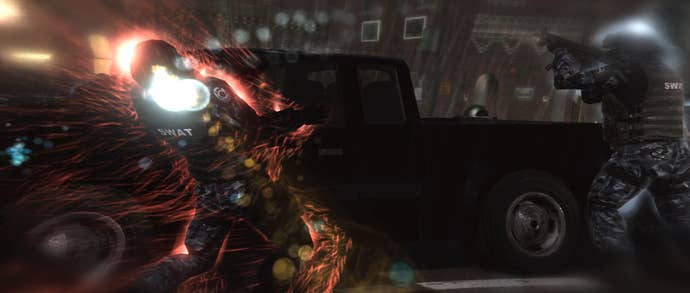
There's also a distinct lack of real control. Aiden is Jodie's ghostly companion, who can float freely around within a certain distance of Jodie, move objects, and possess or kill people. Sometimes you can possess people, sometimes you can kill them. There's no rhyme or reason to determining which is which. No clear rules. Sometimes a character may have a blue aura, meaning you can't do much but listen to them, only for their aura to turn red or orange a few minutes later. No explain is given for the switch. This made me clearly cognizant of the fact that I was playing a game. I could possess guard A and not guard B because Quantic Dream wanted me to possess guard A. That's how they scripted the scene, even if possessing guard B might make more sense to me, the player.
Aiden is presented as an autonomous entity and there's a few situations in the game where his presence would've been helpful and logical, but you'll unable to switch to him because the game won't let you. It destroys the illusion of choice, which is important for a game like this. You're just going through the motions the developer decided you should go through.
There are a few meaningful choices in the game, but they don't drive fundamentally important parts of the plot. Instead, you'll spend a great deal of time walking around areas trying to figure out what the developer wants you to interact with in order to get to the next scene. Not all of the interactions you're given even add to the story being told; you're just going through the motions and at times, it's a definite slog. The game part of Beyond: Two Souls takes a backseat to the story. Quantic Dream has a tale it wants to tell, so the developer did its best to minimize you screwing that up.
Unfortunately, the writing in Beyond: Two Souls isn't great. Cage's writing doesn't always fully explain the relationships or situations presented in the game. He obviously wants you to care about certain characters, but doesn't give you ample reasons why. Character actions will whiplash you occasionally; a character will do one thing to establish themselves and then later - sometimes in the same scene - do something completely different.
Certain situations seem contrived just to get Jodie from point A to point B. The plot, as a whole, isn't ground-breaking; with some cutting and trimming there'd be a decent movie or television show here, on the same level as Source Code or Butterfly Effect. The story is told out of order and that may turn off and confuse some players, but once I understood all of the pieces, the full journey made sense. Jodie's adventure really feels like a slightly different version of the old Incredible Hulk TV show: Jodie gets into a situation, Aiden does the mojo, and Jodie has to leave again. But while Beyond uses some of the language of film and television, the fact that it's a game is one of the stumbling blocks.
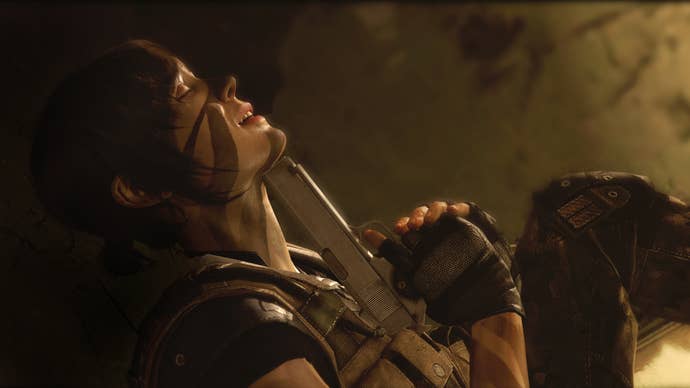
Storytelling in movies relies on cutting out scenes that do not directly add to the story being told. If nothing particularly noteworthy happens to a movie character flying from California to Japan, that part isn't shown. The problem with Beyond - and some of Cage's earlier work - is that some of those scenes are shown and experienced. You take control of Jodie as she ambles slowly from one place to another. Nothing's being said, nothing is added by those extra minutes of controlled movement, they just feel like they're there to justify being a game. The cinematic nature of Quantic Dream's games means things like that are thrown in sharp relief, in a way they wouldn't be in another less realistic adventure game.
Worse, these scenes throw off the pacing of the more movie-like scenes. They add padding where there doesn't need to be padded. The emotion of Jodie leaving the lab that she's called home for most of her life is lessened by the fact that you're wandering around her room around picking things up at random. One scene that takes place in the desert is made far too long due to the mechanics of moving Jodie from point-to-point to discover the next step in the story. I replayed parts of the game again to get other endings - there are reportedly 23 of them - but I dreaded replaying certain sections, which is never a good thing.
The 'game' and the 'movie' that make up Beyond don't mesh well together. I'd praise Quantic Dream for trying, but this isn't 2005 when Indigo Prophecy came out. This is their third go-around in the same genre and it's an evolution of Quantic's work. Other games are doing a similar thing now: Gone Home, Amnesia: A Machine For Pigs, and The Walking Dead, are great examples of storytelling games. Telltale has Fables: The Wolf Among Us coming out today, and The Chinese Room has the PS4-exclusive Everybody's Gone to the Rapture coming soon. And most these games are delivering their experiences for a fraction of Beyond's $60 price tag. It's no longer innovative and ambitious, unless you count the fact that Quantic Dream is doing it on a budget and scale the others can't match. Cage and Quantic Dream are pioneers of this format and at this point, I expect more from them. Beyond doesn't live up to that expectation, even if it doesn't totally fail.
The Details
- Visuals: Beyond pushes the PlayStation 3 to what must be its limit. The game looks great and action scenes are directed well.
- Audio: The music is appropriately haunting and epic. It's not the best soundtrack, but it would fit in any feature film.
- Interface: The interface is sparse and occasionally, it'll be unclear what direction you're supposed to tap the analog stick in order to interact with the game.
- Lasting Appeal: The game is 10 to 15 hours, and there's a bit of replay in revisiting chapters to see the effect of other choices. Other than that, it's done in one.
ConclusionQuantic Dream has come a long way since Indigo Prophecy, but some things haven't changed. The presentation has gotten much better, but Cage's writing is still not up to snuff. There are definite highs in Beyond, but not all of the elements of the game or the story work as a cohesive whole.


